#Historical resorts in India
Text
Explore Dholavira - A 5000-year-old Harappan Gem in Gujarat
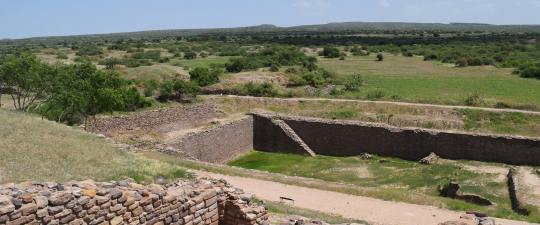
Explore the ancient Harappan city of Dholavira with Evoke Dholavira. Discover its sophisticated urban planning, artifacts, and the mysteries of a 5000-year-old civilization. Book your stay for a unique blend of history and luxury in the heart of Gujarat. Visit evokedholavira.com for more information and reservations.
#Dholavira archaeological site#Harappan civilization history#Luxury stays in Dholavira#Ancient city tours India#Evoke Dholavira bookings#Dholavira travel guide#Ancient urban planning Dholavira#Dholavira artifacts and inscriptions#Cultural tourism in Gujarat#Historical resorts in India
0 notes
Text
Desi Parenthood, Adoption, and Stereotypes
I have a story set in the modern day with supernatural traces, with three characters: a young boy, his bio dad, and his adoptive dad. The boy and his bio dad are Indian, the adoptive dad is Chinese.
The bio dad is one of the few people in the story with powers. He put his son up for adoption when he was a child because at the time he was a young single father, had little control of the strength of his powers: he feared accidentally hurting his child. The son is adopted by the other dad, who holds spite to the bio dad for giving up his son since he lost his father as a young age and couldn't get why someone would willingly abandon their child.
This also results in him being overprotective and strict over his son. When the child is older, the bio dad comes to their town and the son gets closer to him, which makes the adoptive dad pissed, mostly acting hostile to the other guy, paranoid that he'll decide to take away the child he didn't help raise. Later when they get closer he does change his biases.
I can see the possible stereotypes here: the absent father being the darkskinned character, the light-skinned adoptive dad being richer than the bio dad, the lightskinned character being hostile and looking down on the darkskinned character, the overprotective asian parent, the adoptive dad assuming the bio dad abandoned the son. The reason for his bias isn't inherently racist, but I get how it can be seen that way. Is there a way to make this work? Would it be better to scrap it?
Two problem areas stand out with this ask:
You seem confused with respect to how racial stereotypes are created, and what effect they have on society.
Your characterization of the Indian father suggests a lack of familiarity with many desi cultures as they pertain to family and child-rearing.
Racial Stereotypes are Specific
Your concern seems to stem from believing the absent father trope is applied to all dark-skinned individuals, when it’s really only applied to a subset of dark-skinned people for specific historical/ social/ political reasons. The reality is stereotypes are often targeted.
The “absent father” stereotype is often applied to Black fathers, particularly in countries where chattel slavery or colonialism meant that many Black fathers were separated from their children, often by force. The "absent black father" trope today serves to enforce anti-black notions of Black men as anti-social, neglectful of their responsibilities, not nurturing, etc. Please see the WWC tag #absent black father for further reading.
Now, it’s true many desis have dark skin. There are also Black desis. I would go as far as to say despite anti-black bias and colorism in many desi cultures, if one was asked to tell many non-Black desis from places like S. India and Sri Lanka apart from Black people from places like E. Africa, the rate of failure would be quite high. However, negative stereotypes for desi fathers are not the same as negative stereotypes for non-desi Black fathers, because racially, most Black people and desis are often not perceived as being part of the same racial group by other racial groups, particularly white majorities in Western countries. Negative stereotypes for desi fathers are often things like: uncaring, socially regressive/ conservative, sexist. They are more focused around narratives that portray these men as at odds with Western culture and Western norms of parenting.
Desi Parents are Not this Way
Secondly, the setup makes little sense given how actual desi families tend to operate when one or both parents are unable to be present for whatever reason. Children are often sent to be raised by grandparents, available relatives or boarding schools (Family resources permitting). Having children be raised by an outsider is a move of last resort. You make no mention of why your protagonist’s father didn’t choose such an option. The trope of many desi family networks being incredibly large is not unfounded. Why was extended family not an option?
These two points trouble me because you have told us you are writing a story involving relationship dynamics between characters of both different races and ethnicities. I’m worried you don’t know enough about the groups you are writing about, how they are perceived by each other and society at large in order to tell the story you want to tell.
As with many instances of writing with color, your problem is not an issue of scrap versus don’t scrap. It’s being cognizant of the current limits of your knowledge. How you address this knowledge deficit and its effect on your interpretation of your characters and the story overall will determine if readers from the portrayed groups find the story compelling.
- Marika.
I have one response: what? Where are the father’s parents? Any siblings? Is he cut off? Is he American? A Desi that has stayed in India?
Estrangement is not completely out of the question if the father is Westernized; goodness knows that I have personal experience with seeing estrangement. But you haven’t established any of that. What will you add?
-Jaya
#Black#Indian#South Asian#Desi#absent black father#stereotypes#tropes#adoption#colorism#research research research#parenting#strict Asian parents#Asian families
551 notes
·
View notes
Note
I mean this with ZERO disrespect, I'm simply trying to educate myself on this matter because it impacts us all.
All I can find about the Israel-Palestine conflicts is the fighting. What I want to know is why.
Whats the backstory? Why are they fighting? Why is everyone persecuting one another and who in the government is responsible?
I heard Hamas bombed Gaza and has taken hostages. What brought on this violence? Do all the Palestinians agree with this?
(More personal opinion questions, you don't need to answer these)
Do you agree with Hamas? Do you think that violence was a last resort to free Palestine? Do you think it's justified?
One thing I do hate is people saying "I hate *this group of people*, they are bad." They can't all be bad. So I don't like the titles of Anti-Israel/Anti-Palestine because you're assuming everyone there is on the same side.
In conclusion, people are stupid. The government is messed up. Citizens and families want to live so why won't the government let them?
I’m genuinely grateful that you’re asking because educating ourselves is one of the greatest tools we have. I’ll break it up into sections.
1. What’s the backstory?
In 1918, the Ottoman Empire conceded land they controlled to Britain (this is still an ongoing problem regarding many, many things because the Ottoman Empire controlled many nations that weren’t theirs to control if you catch my drift. Look up the Elgin marbles for a fun wormhole of WTF Britain). The Arab Revolt was backed by France and Britain with the promise that if the Arab fighters could force the Ottomans out of the area of the Levant, they would be granted independence (McMahon-Hussein Correspondence) but, plot twist, France and the UK instead split the region (Sykes-Picot Agreement). The Balfour Declaration of 1917 expressed Britain’s support of the creation of Israel. After they gained control of the region, they established Israel and systematically began to take the land of Palestinians.
Note: Zionism began as a belief in the mid-18th century. Many, MANY Jewish people do not subscribe, encourage, or promote the idea of a Jewish state. I do not view Israel = Jewish because it is antisemitic to imply that the Jewish diaspora all exist under the state of Israel. Especially when many Jewish people disagree with Israel.
Note note: Zionism was created as a response to the numerous pogroms and other antisemitic hate crimes affecting Jewish people. the Holocaust was fucking awful. No ifs ands or buts. Genocide doesn’t justify genocide, however.
Continuing on. So, clearly, the Palestinians are pissed. They were promised independence and instead now have their land taken by a global superpower who has historically fucked over hundreds of countries (another wormhole for you: India under British rule, Ireland and literally all of its history with England, the transatlantic slave trade under Britain, Africa under British rule, Australia and the treatment of Aboriginals under British rule, America and the British, it goes on). Palestinians revolted from 1936-1939 because, again, their home and promise of independence was being stolen. They lost against the British army but then 1939 was a bit of an important year for everyone and they world was sucked into another world war.
With WWII saw the birth of the United Nations, an organization that might sound important but has the moral backbone with the equivalence of a chocolate eclair. The UN said “hey, why don’t we split Palestine and Israel into two different states so maybe they’ll stop fighting” (United Nations Partition Plan for Palestine) and, as a result, the 1948 Palestine-Israel war began. Hundreds died. 700k+ people were forced from Palestine and spread across the world in what is called the Nakba. Israeli colonizers quite literally moved into homes that had been occupied by Palestinians only days before. In 1918, the Jewish population of the region was 8.1%. In 1948, when Israel was recognized as a nation by the UN, the Jewish population of the region was 82.1%.
2. There’s plenty of infographics and videos explaining the next few decades but I’m already writing an essay basically so the gist is: Palestinians keep losing their homes and Israel keeps taking them. Israel forces the Palestinians into smaller and smaller parcels of land until the control virtually everything but a small strip of land (Gaza) and the West Bank. That brings us to 2006.
Hamas was elected in 2006 over rivaling Fatah, gaining majority amount of seats in the Palestinian Legislative Council under the promise that they would help end the corruption many Palestinians were frustrated with. Instead they took military control over Gaza and established an autocratic state over millions of people who were already suffering under barbaric policies and practices from Israel. Politicians.
This is where things get a little…messy morally. Do I agree with Hamas? Fuck no. I couldn’t care less about Hamas because they don’t care about Palestinians. Do all Palestinians agree with Hamas? Firstly, you will rarely find a group of people where all agree with some. Secondly, I don’t think they appreciate being bombed by Israel while Hamas leaders chill somewhere else. The people of Palestine are the victims of Hamas and Israel.
Did some Palestinians celebrate Hamas’ actions? Yes. Do I think violence is a last resort? Yes and no. Do I think it’s justified? Yes and no.
Lemme expand on those last two points. I want to be an international human rights attorney someday. The loss of innocent life is always a fucking tragedy that I hope to help prevent or to bring justice for them. I understand violence. I understand why people are so angry. I understand the rage and grief Palestinians feel. 75 years of having their rights stripped away, their homes quite literally occupied, their land and culture chipped away piece by piece, and their children bombed and shot at.
“But how on earth can you think violence is justified if people get hurt!” The American Revolution was an act of violence that got numerous people killed yet you will rarely find someone who won’t justify it. Ukraine defending themselves against Russia wanting their land with no regard to how many Ukrainians they kill is considered justified.
People just seem to focus on the “violence is bad” aspect of things once POC are involved. Yeah, I said it. Americans tired of taxation, of British rule, and of not having their independence causes property damage, argues with soldiers in the streets, and starts a war is okay but when Palestinians do it, it’s a problem? When Black Americans ask to stop being brutalized by the police, it’s a problem? When Black South Africans ask to end an apartheid state, it’s a problem? When Central Americans ask for western nations to stop causing coups that destabilizes their nations, it’s a problem? I could go on.
Yeah, violence is bad. Violence is also the way that a lot of countries are where they are today. Violence is sometimes the only reason why things changed. Violence is enacted on the oppressed everyday yet people only seem to really care once the oppressed fight back.
3. I’m anti-Israel because I don’t agree with the government and the state of Israel. I don’t agree with their 75 years of violent oppression of Palestinians. I don’t agree with their current or past actions. I’m anti-Hamas. I think they’re a vacuous organization that is more focused on getting what they want than considering the consequences of innocent Palestinians.
I’m also really fucking furious at Joe Biden’s insistence that we send aid to Israel. We have given Israel $260 BILLION since 1948. BILLION. And yet we have people dying because they can’t afford healthcare. Students leaving school because they can’t afford tuition. We have 8 year olds in debt because they can’t afford school lunches. The unhoused population is growing rapidly due to the housing crisis. I can sense the unemployment rate creeping higher. I know many people who have lost their jobs this past month alone. We’re days away from another government shutdown and they can’t vote on a speaker.
American politicians would rather send Israel billions more to bomb innocent people than to feed their own citizens. That, in my opinion, is a sort of violence that can never be justified.
#honey.txt#sorry for the essay#but really not sorry#I took a whole class on the global south during the Cold War and it really opened my eyes#granted my specialization is Central America but plot twist#America has been at the center of fucking stuff up there too
36 notes
·
View notes
Text
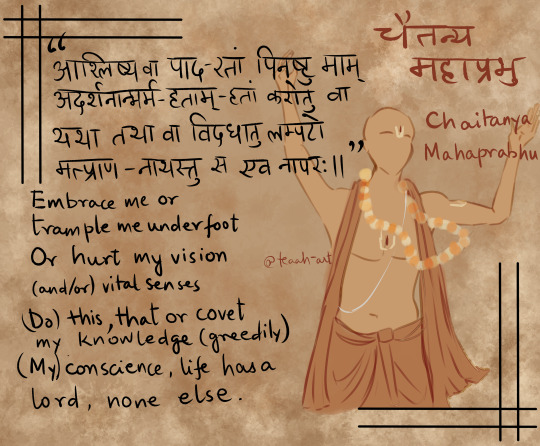
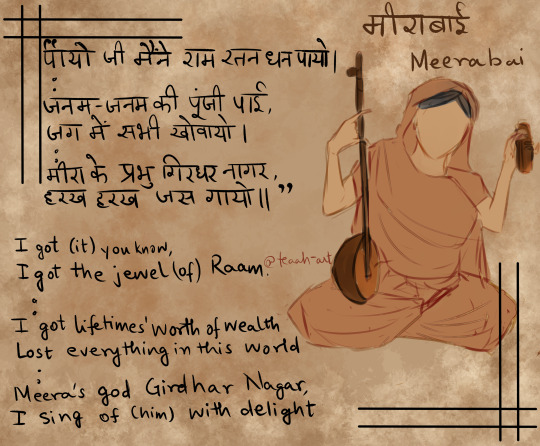
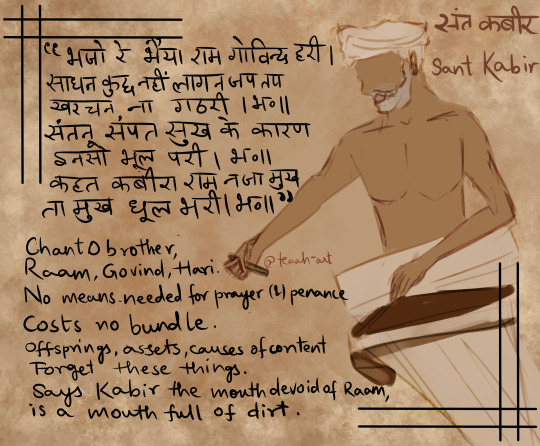
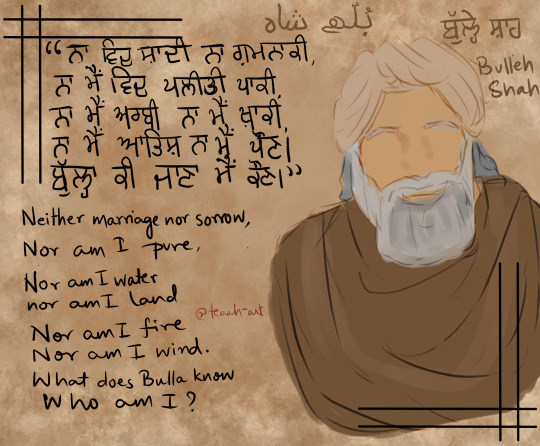
Desi LGBT Fest 2023 (hosted by @desi-lgbt-fest)
Day 7 : Faith/Rituals of Love
Definitely geared heavily towards the 'Faith' part of this prompt as soon as I read it!
If being Queer is defying conventions and if being a part of the Queer community means going against heteronormativity and gender conformity, is it not Queer to forego materialistic ties and the love of a human partner and embrace the love of a greater being you have only heard about in stories?
All four individuals featured here were integral part of the Bhakti Movement and/or Sufism in South Asia. None were married other than Meerabai.
(Panel order from top to bottom)
Chaitanya Mahaprabhu (1486-1534) : A key name of the Bhakti Movement and the Gauriya Vaishnav tradition in 15th Century Bengal, Chaitanya Mahaprabhu was believed to have been a vessel for both Radha and Krishna. Bengali doesn't use pronouns or gendered language and we may never know what they would have preferred to be identified as in a language they didn't know (English), I will simply resort to using They/Them for them. Their written teachings are few and far between but the verse mentioned here is the seventh verse of the only written record of their teachings, the Shikshastakam - a collection of 8 total verses. The translation here is my own and quite literal so that the interpretation is left to the reader.
Meerabai (1498-1597) : [CW : IMPLIED QUEERPHOBIA/APHOBIA] Meerabai was born into Rajput royalty and was married off, also to Rajput royalty, in likely an arranged marriage. While most of the stories surrounding her are folklore whose historicity is yet to be confirmed, her marital status can be confirmed, and so can her devotion and affection for Krishna and the divine, which she has herself penned in numerous poems and songs. Folklore does strongly imply that she was non-committal to her marriage and that her in-laws tried to poison her to death multiple times for it.
Kabir (1398–1448 or 1440–1518) : Found as an orphan by a Muslim weaver couple, Kabir's religion grew to become somewhat of an enigma for future generations. His stance, however, on the topic romance and marital relationships is quite clear - he looked down upon them and a huge chunk of his couplets strongly imply that romantic and sexual relations simply obstruct spiritual enlightenment.
Bulleh Shah (1680-1757) : Bulleh Shah, though an ardent proponent of loving the divine, was declared a Kafir, a non-believer/non-Muslim by a quite a few Muslim clerics of the time. He was known for speaking up against existing power hierarchies of the time and used vernacular speech for his writings (Punjabi, Sindhi) which not only served to popularize his works, but also let people connect to his words.
A personal note on my motivations under the cut.
A while back when I was actively going through the anxiety of finding out that I am ace and that I will never fit into the current South Asian society that the wedding industry has a chokehold on, I desperately wanted to see people from my own culture living happily without a partner. During one of my history rabbit hole escapedes, I restumbled upon the story of Meerabai, how she always insisted on loving and devoting herself towards Krishna, despite being married into a normative and wealthy household and despite her in-laws repeatedly attempting to poison her for not committing to her husband. Most of us from India grow up hearing about Meerabai, her spiritual connections to Krishna, and her struggles. The moral of those stories is always framed as 'believe in god, he will help you through tough times'. But this was the first time I was making a different connection, I was drawing different morals. And when I took Meerabai's non-conformity to her married life and started looking for more examples like hers, I was overwhelmed by how many more individuals existed without a partner, condemned being in a normative, married relationship, admitted to having lost human connections and faced resistance even, and yet stayed true to their orientation and sounded HAPPY! It was extremely hard to narrow it down to these four, but these do make my point! Labels are hard to transpose across cultures and history. But if being queer means being nonconforming of marital structures and being aspec/arospec implies neutrality, indifference, or aversion to romance and intercourse, then no one fits the label if they don't.
#desilgbtfest23#desi lgbt#desi lgbtq fest#long post#pride 2023#pride#original art#my art#meerabai#meera bai#sant kabir#kabir#kabirdas#bullehshah#bulleh shah#chaitanya mahaprabhu#bhakti movement#sufism#sufi#tw implied aphobia#tw mild aphobia#tw implied homophobia#btw if someone notices errors in my Shahmukhi or Gurumukhi on the Bulleh Shah illustration pls let me know#I do not speark or read or write Punjabi and I copied
82 notes
·
View notes
Note
That Pakistani girlie had me laughing my ass off for 10 minutes. She's so delusional omggg!!!
It's sad though, when we google Ram Mandir the only articles that show up are presenting half-baked story, deliberately hiding facts and fulfilling the leftist narrative.
Anyone who's gonna look over stories are gonna make the conclusion - wait, Hindus are unstable nationalists (derogatory) who are oppressing The Minority™. I still don't know why they're doing it - what are they gaining from painting wrong picture?????? Why do they want the world to hate Hindus so bad they've gone so far to resort to historical revisionism and erasure.
Note - Sikhs and Jains have been tremendous helpful in our struggle to reclaim this one temple. They understand why Ram Mandir is important to India not just Hindus. They understand Babri Masjid wasn't a place of Worship it was a monument of Slavery.
PS - many christian organisations have donated to ram mandir as well as muslim organisations too.
The only ones pissed off are Leftists who want to brainwash others into being hateful bigots by any means even if it means revisionism and erasure.
Pakistani girl was so delusional. A textbook example of what happens when you only consume media from Al Jazeera.
Biased media in India for the win😔. Not to mention even foreign media outlets covered the inauguration with skewed headlines.
According to Anand Ranganathan, "Taxidermy fetish is what it is". Literally that.
I always find it funny when they call people like me a bigot, like, you can have your opinion? I genuinely don't care? Why are you coming into my blog, an awareness blog and calling me a fascist freak? That's not very "peaceful" of you lmao.
You're so real for this anon.
16 notes
·
View notes
Text
February 9th, 2024


Painted Grasshopper (Poekilocerus pictus)
Distribution: Found in India, Pakistan, Afghanistan, Nepal, Bangladesh, Sri Lanka, Bhutan and the Maldives.
Habitat: Show a preference for dry regions.
Diet: Adults and nymphs most often feed on milkweeds of the genus Calotropis, especially C. gigantea and C. procera. In absence of their preferred food sources, they will feed on a wide range of other plants, including agricultural crops such as wheat, papaya, citrus, castor, eggplant and mango. They will occasionally resort to cannibalism if they're starving.
Description: The painted grasshopper's most well-known trait is their toxicity, which stems from their diet of toxic milkweed sap, the toxins in which are classified as cardiac glycosides and have historically been used in the creation of poison arrows. Nymphs in particular also have the ability to spray noxious liquid when they're grabbed, to a distance of up to 30 centimetres; when any pressure is put on their head of abdomen, a jet of the viscous, milky liquid is aimed towards the sources of the pressure, with both an unpleasant smell and taste as well as a dose of cardiac glycosides. Adults can also discharge this liquid, though instead of emitting a jet, it comes out as a viscous foam leaking out of the sides of their bodies.
This species is often kept as a laboratory animal in India, as they serve as a great model for the observation of spermatogenesis through meiosis. Their cells also contain a chromosomal repair mechanism that counteracts the effects of mutagens during meiosis, prompting research on the enzymes and mechanisms involved in this process.
Images by Haneesh K.M. (adult) and Rohitansh Upadhyay (nymph).
19 notes
·
View notes
Text
Fear and Hunger is such an awesome game that only hardcore channels cover because most famous players cater either to children, more sensitive folks or to the pussy 'omigosh how DARE a game depict realistic brutality and sexual violence even though it DOESN'T glorify it in the least' crowd. Yes, some people are legit uncomfy with that stuff and that's totally fine (even though I personally will NOT be discussing media with those types. Too easy to spook them), but the nutjob crowd on social media would've thrown a hissy fit over this game. What a shame.
Also, it's honestly pathetic how some people say the game 'trivialises' or is 'problematic' in its depiction of frequent sexual violence / nudity. As someone who lives in a country where rape horror stories are well - known (India), I'll provide an explanation to y'all. The dungeons and historical war setting are the core of this story. Historically and even nowadays, prisons are chock - full of depravity. Warfare and famine enable the shittiest among us to dominate the social order. When it's universally accepted that awful people in positions of power WILL murder, torture, pillage in such situations - how come sexual assault is out of the question for such an uncaring mind ? Face reality, both 'normal' and less - triggering - for - sheltered - USAmericans forms of violence, AND sexual violence have been and ARE distressingly common in the settings this game depicts. It's not problematic, it's just the truth. The devs, streamers, any content ratings website gives you ample warning about these elemnts. If you can't handle it that's a YOU thing. This story is for those people who CAN handle it.
Also the violence and gore are perfectly historically accurate too. You get a hopelessly infected limb, even nowadays ? It gets amputated. You don't have a safe medical facility around to assist ? It gets amputated painfully without anaesthesia. People used to easily die of what today are laughably small wounds, because they got infected. Germ theory didn't exist. Starvation was widespread. Betraying your fellows to terrible fates to save yourself is a timeless viable strategy - we privileged asses can't complain about it cuz we've never had to face those terrors. It is in fact ABNORMAL to not resort to cannibalism or deceit to survive in terrible conditions with no way out. You'd have to be suicidal, too good for this world, a rabid religious fanatic or psychopathic to not do so. I am none of those, and nor are 99.99 % of you.
And about sexual content in general - there's a reason soldiers / mercenaries and prostitutes have often gone together. Warfare is stressful and you're constantly hoping you won't be the next one to die or get captured / wounded. Sex is a great stress reliever and literally the opposite of death. I'm not saying prostitution networks can't be exploitative. But it makes sense why high - anxiety professions are big users of these services.
#fear and hunger#fear and hunger 2#funger#cancel culture#puritanism#censorship#tw sa#tw rape#tw cannibalism#tw gore#tw body horror#tw violence
9 notes
·
View notes
Text
“This is how colonialism works. It convinces us that the fallout from resistance is entirely our fault, that the immoral choice is resistance itself rather than the circumstances that demanded it.” — R.F Kuang, Babel
Resistance does not happen in a vacuum.
Resistance, rebellion, protests, marches, demonstrations, and boycotts all happen in response to injustice.
When you know the context, your humanity should pull you to come out in full support of the Palestinians.
If, after reading this whole post, or even half of it, if you are not emotionally moved or heartbroken by the oppression … I don’t even know what to say.
•
•
When Native Americans fought for their land, the white people called them “savages” while the emigrating thieves were “civilized” and considered themselves “victims.”
Mandela’s ANC (African National Congress, a liberation movement known for its opposition to apartheid) was considered a terrorist organization by the oppressors.
The Philippines were colonized by the Spanish for 300 years, then by Americans and then the Japanese. Their historical liberation movement was called “terrorism.” (And the League of Filipino Students stand with Palestine.)
The Hawaiians’ land was stolen. It’s a resort. Whenever you see it in stories (movies, tv shows, books), it’s for when the characters go there on vacation; and their culture gets warped, exaggerated, mocked, purposefully misunderstood, and also sexualized. But in reality, even til this day, indigenous children are punished for speaking their native language in school. Their language and culture is nearly extinct. All Hawaiians should be able to speak their language, not just a percentage of them. Even if you can’t relate, at least you can dig and bring up your compassion and empathy to the surface. Is it wrong to be angry about this? Is it wrong to fight back against colonialism and imperialism and capitalism?
Korea had their own independence movement and liberation army. It lasted decades. Yes, they used violent attacks. You wouldn’t have all those beautiful K-dramas to watch on Netflix, if they didn’t literally fight for their freedom.
India, too.
When Palestinians fight back against the oppression, they’re called “terrorists.”
These people are subjugated. It permeates every waking moment of their life. The Israeli colonizers who would call themselves ‘victims’ are the same people who “control the most simple and basic elements” of Palestinian life.
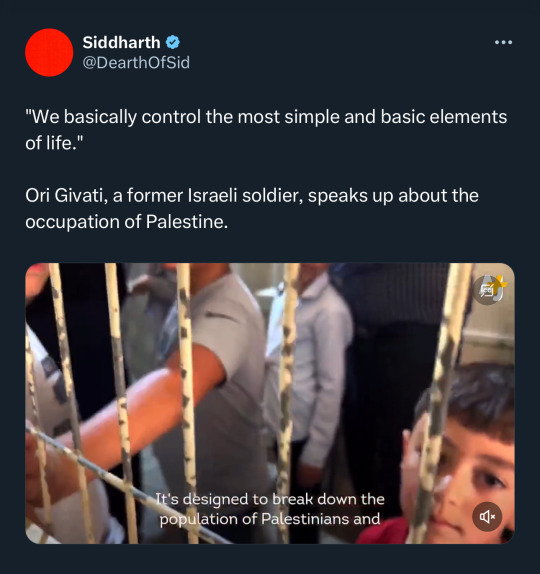
Read that again.
“We basically control the most simple and basic elements of life.” — Ori Givati, former Israeli soldier, speaking up about the occupation of Palestine.
With context, it’s a thousand times more chilling. But even without it, especially if you can relate to being controlled over everything by a bigger but terrible person while growing up, that sentence alone is heartbreaking.
But it shouldn’t take that sentence for people to realize that that’s what it’s been all along since 1948. You just need to open your eyes and see how they, the Palestinians, are treated.
The Palestinians’ water wells were cemented by Israeli soldiers, to stop them from getting clean water. So, forget the Israeli government turning on a simple switch to allow water from their pipes – ‘cause the Palestinians can’t even get fresh water on the only strip of land they have!
How can anyone defend or justify that?
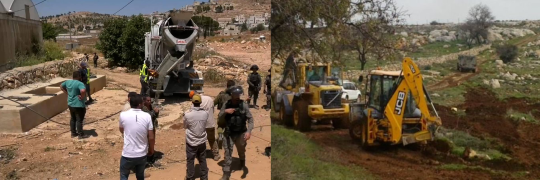
Also, the millions of olive trees that had lived through generations (and it takes years for a new olive tree to produce anything) were destroyed by the Israel occupation since 1948. Now why would Israel destroy olive trees? Olive trees have a very special significance throughout the Middle East. Olive trees are important to Palestinian culture and heritage.
But Israel still continues to burn or destroy agriculture (aside from the bombs destroying it), they never stopped.
Gazan fishermen cannot even fish freely, there have been limits to how far out in the water they could go.
From the words of a Palestinian woman who works in a border school affiliated with the UNRWA (United Nations Relief and Works Agency for Palestine Refugees in the Near East, established in 1949), translated to English:
“Fishermen are hunted at sea and they're falsely accused of getting close to the border. The fishing area keeps shrinking that they now have a tiny area from which they can make a living.”
Full post is here. For heaven’s sake, it takes a year to even get an item that they order from the Internet finally delivered, and even then it’s not a guarantee. The Israeli soldiers won’t give it to the purchaser if it’s dual-use.
Diving goggles are classified as dual-use, so the woman (who wrote the post I just linked) wasn’t able to get them. DIVING GOGGLES!
Where is your humanity?
If you are so desensitized to the gravity of this happening to 2 million people in the year 2023, and if you see all the deaths as just a number, and these numbers are just a statistic to you … I don’t know what I could say to make you understand.
How about the words of a Native American who visited Palestine in the past, and said it reminded him of his home in the U.S reservations? The United States government stole native land hundreds of years ago, and life in reservations are still so bad that this person felt at home in Palestine. THINK ABOUT THAT!
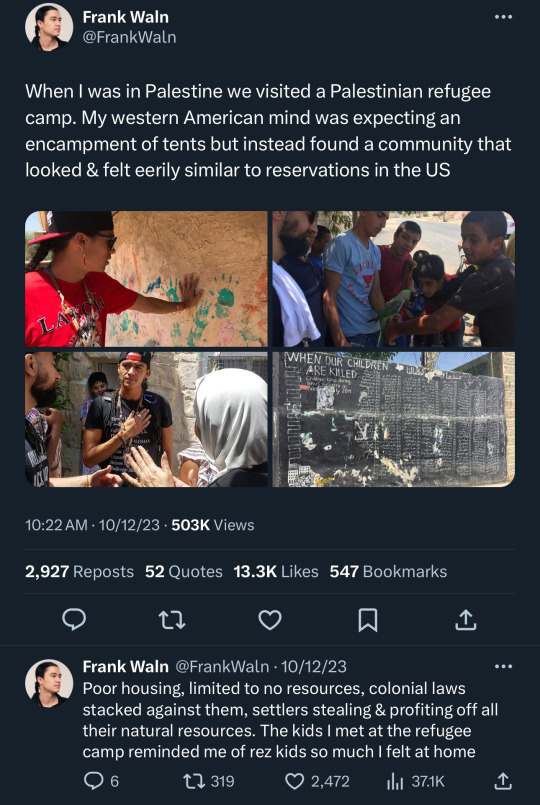
Go ahead, try and tell me Israel isn’t an apartheid that’s even worse than Nazi Germany, or the U.S. genocide of Native Americans.
This occupation has been going on since 1948! Gazans need a permit to enter West Bank (which is often denied to them), and there are checkpoints on every street. And that’s just the tip of the iceberg.
Even when you finish reading this post, it doesn’t showcase half of how much oppression there is.
•
The Israeli government “control the most simple and basic elements of life” there. That was a quote from one former Israeli soldier.
Here’s another former Israeli soldier, speaking up against the occupation, (Eran Efrati):
“I was broken. I felt like I was the terrorist. And my job was literally to scare people so they cannot think about acting against the Israeli settlers.”
“Very early on, I understood that the rights that the Jewish settlers have are not the rights that the Palestinians have.”
“I understood that I cannot touch a Jewish settler if he is attacking a Palestinian.”
“So (these) Jewish settlers that live in Hebron are living under the same rights that I live in, in Jerusalem. But the Palestinians next to them, next house over, next building over, or sometimes next apartment over, lives under my rule, my military rule.”
“And I can do whatever I want with him.”
By the way, this is Stage 3 of the 10 stages of genocide: Discrimination. The Stage 2 is Classification, and Palestinians are a separated group under Israeli law.

Here’s the link to the video.
And a former Israeli Air Force pilot, Yonatan Shapira, said this:
“I was a captain in Israeli Air Force, I was a helicopter pilot and I realized during the 2nd Intifada what Israeli Air Force and Israeli military doing is war crime, terrorizing population of millions of Palestinians.”
“As a child in Israel, you are being brought up in very strong Zionist militaristic education. You don’t know almost anything about Palestine, you don’t know about the Nakba, 1948, you don’t know anything about ongoing oppression.”

Here’s the link to the video.
•
As of October 30, 2023, Israel has wiped out 881 families. Lineages. Bloodlines. This means 30 to 80 persons in EACH FAMILY.
On October 17, that number was only 47 bloodlines.
« Gaza, Oct. 29 (Petra) - The death toll from the war on Gaza has reached 8,005, including 3,324 children, 2,062 women, 460 elderly people, while 1,870 people were reported missing, including 1,020 children, according to the Ministry of Health in Gaza.
The ministry spokesman said the Israeli occupation has carried out 56 massacres in the last several hours, killing 302 Palestinians. Most of the victims were moved to the southern parts of the Gaza Strip, which Israel claims are safe zones.
He added that 116 medical staff were killed, 25 ambulances were destroyed, and 57 health facilities were targeted, pointing out that 881 families were lost as a result of the occupation's purposeful targeting of them. »
And if you don’t believe these numbers, because you’d rather believe Israel – guess what? Israel is keeping score, and published it on their Channel 14 news channel with rising numbers. Israel are genocidal maniacs. It’s not my fault you refuse to believe what your eyes can see.
UPDATE
As of November 25 of 2023, the number of deaths reached 20,000. The number of children among them are 8,176.
•
“We must learn that passively to accept an unjust system is to cooperate with that system, and thereby to become a participant in its evil.” — Martin Luther King, Jr.
“Nice people made the best Nazis. My mom grew up next to them. They got along, refused to make waves, looked the other way when things got ugly and focused on happier things than “politics.” They were lovely people who turned their heads as their neighbors were dragged away. You know who weren’t nice people? Resisters.” — Naomi Shulman
•
•
•
And along with Israel bombing the Palestinians using the internationally-banned white phosphorus—!
It is so violent in its destruction, and, I repeat, it is prohibited under international law! Of course, you’d think that violating the Geneva Convention would result in heavy consequences, but imperialist governments not caring and getting away with anything is a different topic.

It is so wicked, I can’t—
Even if you don’t care about a massive loss of human life, the phosphorus effect on agricultural lands are devastating and lasts for years. It still makes people sick and nauseous with no apparent signs of injury on the plants.
And all the mushroom clouds after those CONSTANT bombs drop on Gaza!
Even if you don’t care about the loss of human life, do you have a speck of humanity in you to care about all the pollution? At the very least?
•
How many times does the Israeli government have to be caught lying or admit to lying, before you realize they can never be trusted because they’re liars? They have a long history of it, too!
OPEN YOUR EYES!


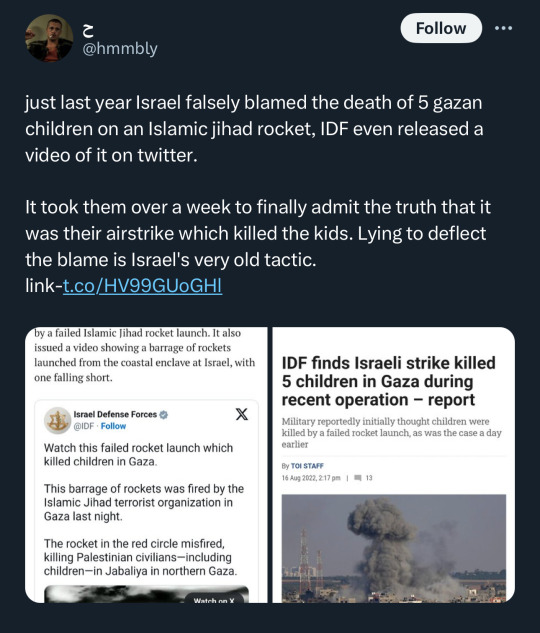
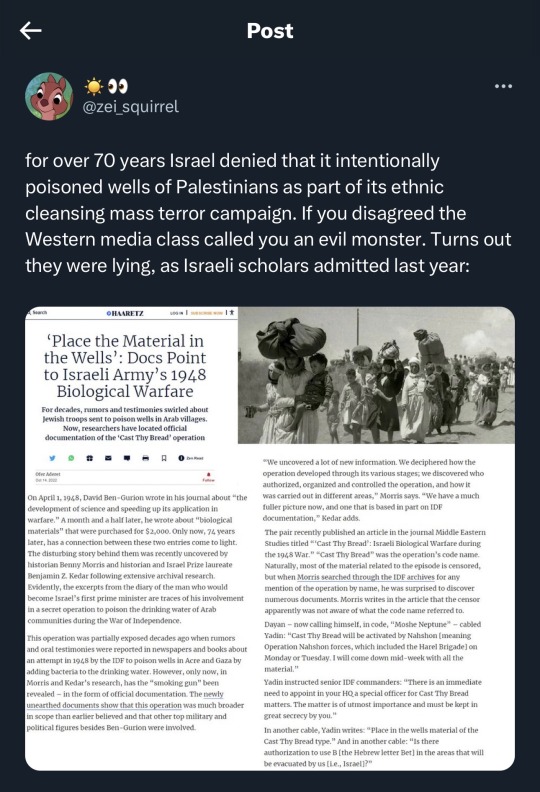
OPEN YOUR EYES!
When the people had a funeral for American-Palestinian journalist Shireen Abu Akleh, the Israeli police kicked and beat the mourners who were carrying the casket.
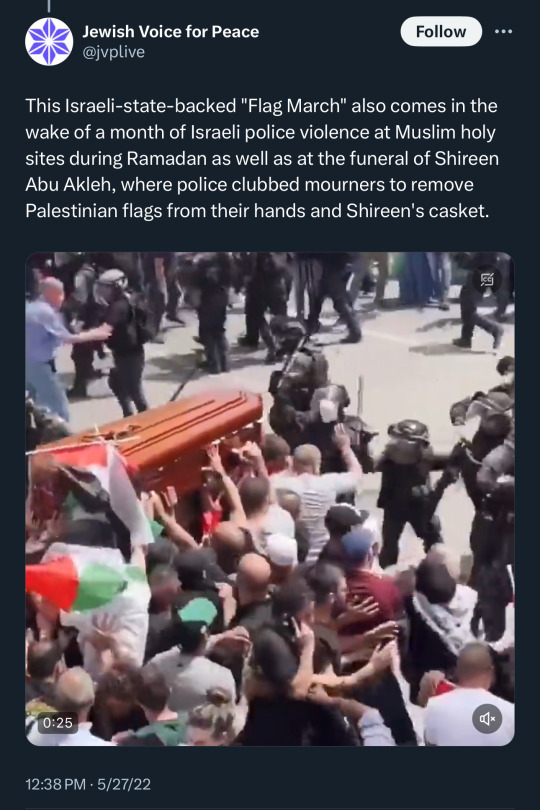
Is it any wonder that there are former Israeli soldiers and pilots who stopped supporting their government because they felt like terrorists, and realized it is Israel who are the terrorists?
Look at this!
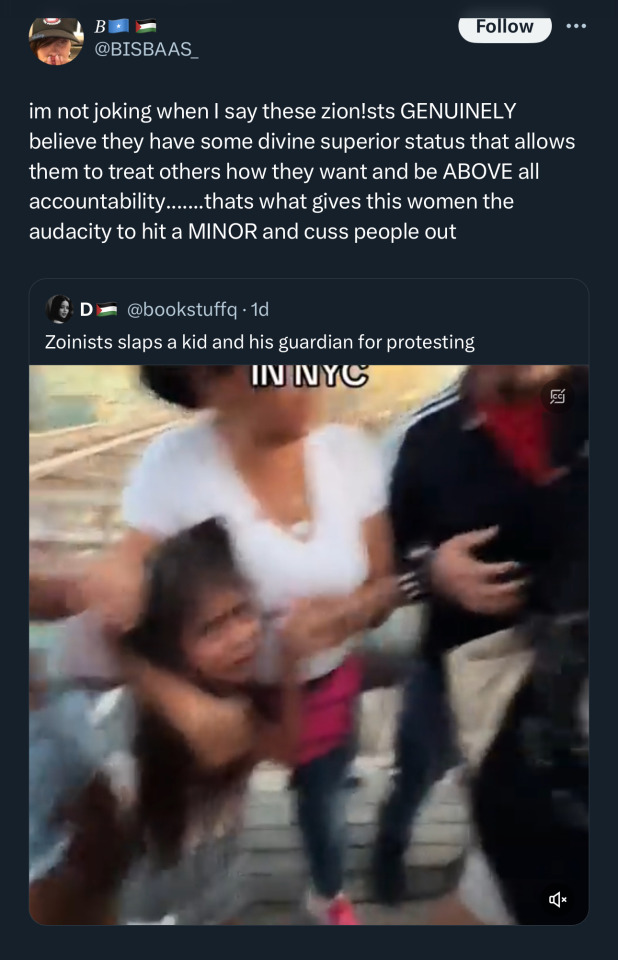

•
It is also NEVER a normal time to say “I’m a little bit fascist,” whether it’s 2000 or 2023…but the video in the tweet below is from 2009. This is an Israeli woman saying, “I’m a little bit fascist.”
Imagine thinking this is normal to talk that way. Imagine thinking fascism is, in any way, good or beneficial.
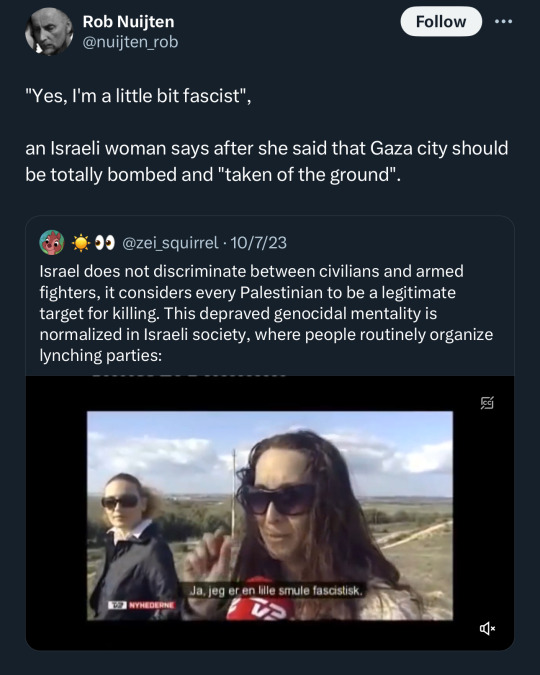
•
The Palestinians in the Gaza Strip do not have basic human rights.
If you value having your human rights, do not turn a blind eye to Palestine.
Their access to the outside world, via WiFi and the Internet, is the one and only way they can spread awareness of what’s going on.
No government should have the power to turn off water and cut electricity and telecommunications.
Collective punishment is a war crime under international law, a crime on humanity that could easily be done to you. You think you’re safe in your country? Every protest and demonstration or march (on any topic, really) is met with the same brutal police treatment. What’s to stop them from going all out, the moment they get the government’s green light? I remember military vehicles coming out in force during the BLM protests. Many people are permanently blind and/or disabled from the tear gassing and the rubber bullets.
•
You cannot justify indiscriminate bombing on a densely populated SMALL area. It’s never right, but think about this…
The Gaza Strip is 139 square miles.
Detroit, Michigan is also 139 square miles.
Detroit only has less than six hundred thousand people in their population. The Gaza Strip has two MILLION.
Religious buildings, universities, hospitals … bombed, all under the excuse that “terrorists” were hiding there.
The same exact excuse Israel used to justify bombing a school in Egypt in 1970, it is not new and not exclusive to Gaza. They always use the same tactics.
•
•
•
What I’m sharing here is pretty much everything I’ve shared (and then some) about the occupation and genocide against Palestinians. So, pardon me if it’s not cohesive, because it’s not really meant to be. I shared most of this just one time with somebody, and I still got hit back by that heartless lunatic threatening me to watch and “enjoy Israeli retribution.”
It’s bad enough seeing it in the comment sections on YouTube or Twitter; it’s even more mind-boggling to have it spoken in direct response to me in my attempt to appeal to what little speck of humanity they have left, so I don’t make a habit of speaking up.
•
•
Palestinians are Arabs. Arabs are Semites.
If, for some asinine reason, you support Israel on the genocide they’re committing right now against Gaza, and you still want to call me an anti-Semite … then you should know that a former Israeli minister of education said (nonchalantly) back in 2002 that they always use that label as a trick on anyone who criticizes the Israeli government.
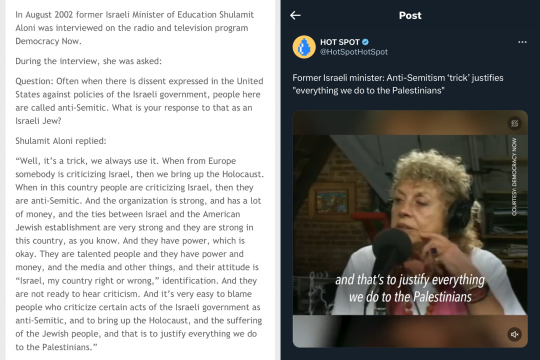
And a former Israeli Mossad agent, in 1995, said that labeling someone an anti-Semite is one of the ways he silenced critics. They know you’re not an anti-Semite, but they will label you as such to discredit you.
Victor Ostrovsky: « But I know what they do ‘cause I used to ask them to do it. When I was in the Mossad and we had a guy that gave us problems in the U.S., and he was speaking out and he was talking like people talk once and said, “Israel is bombing Lebanon with cluster bombs,” we say, “Hey, who’s that guy?” you know? ‘Pete Macockey,’ we used to call him. Yeah, which is Pete the Cockroach, ‘cause he makes a lot of noise and you can’t get rid of him. So, what you do is you get in touch with a guy in the station in New York or in the station in Washington and tell the guys in B’nai B’rith to label him. And, of course, the campaign starts, and before you know it, the guy is labeled. And he’s ‘an anti-Semite’ because that’s what we say he is. It shames me as a Jew to tell you that. But that’s the fact and it’s wrong. »

It SHAMED him as a Jew to say that this is what his government does. This is what Israel does!
The same thing happened in Nazi Germany – it was illegal to even mock Adolf Hitler, or talk badly about the Nazi regime. It’s the same thing regarding CPC, Chinese citizens will have their online posts deleted if they criticize China. And it’s the same with North Korea, it’s actually worse than China – they cannot even consume foreign entertainment if it’s not sanctioned by their government.
If you criticize Israel, their government will silence you by slapping on the “anti-Semitic” label onto you.
As Shulamit Aloni said, “It’s a trick, we always use it.” Thank you for exposing yourselves!
If you’ve reached all the way down to this part of the post, and anything I’ve typed out hasn’t moved you emotionally at all, you should stop calling yourself pro-climate and pro-life.
And look!
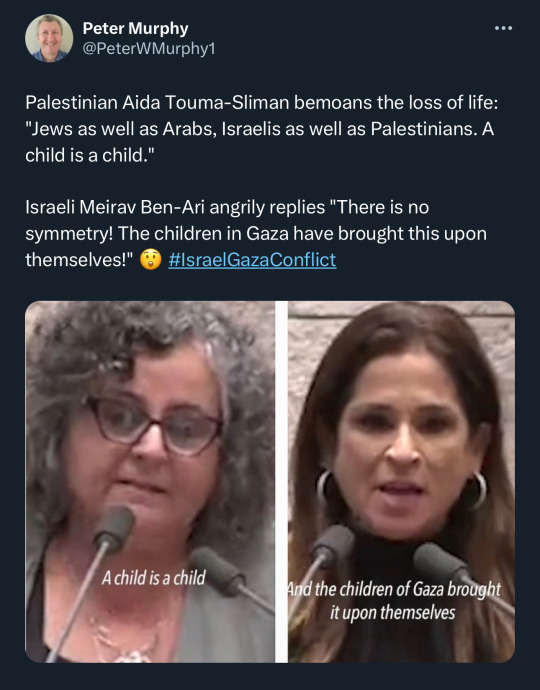

It’s there for all to see.
We don’t even have to expose Israel’s black hearts, they’re doing that all on their own.
We literally just have to point this out. The rest is up to you.
Imagine Russians doing this about Ukrainians!

Is this who you want to defend? “God’s chosen people” mocking cultural attire, comparing Palestinians to dogs, dehumanizing them, degrading their deaths, laughing at mothers losing their children.
Is this the hill you want to die on? IS THIS YOU?!
The depravity!
•
•
•
“Words and terminology are crucial," said Hussam Zomlot, the Palestinian Head of Mission in the United Kingdom. "From the beginning, Israel wanted to link the Palestinian people to Hamas. And then they linked Hamas to ISIS. That’s linking ISIS to what? The Palestinians.”
Article by Lemma Shehadi • October 17, 2023
———
[A thread by Dr_MianUmair1 on Twitter]
There seems to be a lot of confusion regarding the distinction between Hamas and ISIS. It is important to clarify that these are two distinct entities with different goals, ideologies, and methods.
Hamas is a Palestinian political and military organization that was established in 1987. Its primary objective is the liberation of Palestine, Hamas engages in political and social activities, as well as armed resistance against Israeli occupation.
On the other hand, ISIS (Islamic State of Iraq and Syria) is a radical Islamist extremist group that emerged in the early 2000s. Their goal was to establish a caliphate in Iraq and Syria, imposing their version of Sharia law and carrying out acts of terrorism worldwide.
While both organizations have been classified as terrorist groups by various countries, it is crucial to note that their motivations, strategies, and geographical focuses are vastly different.
Hamas primarily operates in the Palestinian territories, with a particular focus on the Gaza Strip; while ISIS was primarily active in Iraq and Syria, although their influence has significantly diminished in recent years.
Hamas, despite being a designated terrorist organization by some countries, also has a political wing that participates in democratic processes and provides social services to the Palestinian people (A reason why they love Hamas)
In conclusion, Hamas and ISIS may share the label of "terrorist organization," but they are not the same. Understanding their distinctions is essential for informed discussions about the region. 🌍🤝
———
But, now, what if I told you that Israel (and the U.S., “indirectly and directly”) created Hamas?
U.S. Congressman, Ron Paul, in 2009:
“If you look at the history, you’ll find out that Hamas was encouraged and really started by Israel because they wanted Hamas to counteract Yassir Arafat [chairman of the Palestine Liberation Organization, PLO].”
“So, then, we as Americans say, ‘Well, we have such a good system, we’re going to impose this on the world, we’re gonna invade Iraq and teach people how to be democrats.’ We want free elections, so we encourage the Palestinians to have a free election, they do and they elect Hamas.”
“So, we [the United States] first indirectly and directly, through Israel, help establish Hamas, then we have election that Hamas becomes dominant, so we have to kill them.”
Hmm, so Israel-U.S help establish Hamas, playing them against each other until they get their dominance, just so Israel can justify killing Hamas and every single Palestinian? That, coupled with the former Israeli politician saying that they slap the ‘antisemitism’ label on critics to justify killing the Palestinians? Wow, Israel and the U.S. sure do sound like the evil villains here. It almost sounds like…they always planned to commit genocide! Look at my shocked face > ö
But anyway…
•
Painting Hamas with the ISIS brush has implications for how Israel is expected to fight its war with the Palestinian militant group, experts told The National.
“There is a danger in comparing Hamas to ISIS, which can indirectly legitimise disproportionate use of violence on civilians in Gaza, under the pretence of fighting terrorism,” Ms Khatib said.
Experts highlighted the US-led coalition’s war with ISIS in 2014, during which Iraqi and Syrian cities were razed, killing up to 11,000 civilians in Iraq alone and displacing hundreds of thousands more.
“The US government labelled its campaign in Syria and Iraq as 'a campaign of annihilation', so for Secretary Austin to be suggesting Hamas is the same or worse is doing little more than encouraging Israel to assume a similarly brutal approach in Gaza,” said Charles Lister, director of the US-based Middle East Institute’s Syria programme.
The 6,000 bombs dropped on Gaza in the first six days, as claimed by the Israeli air force, had already exceeded the rate of US bombing of ISIS in Syria and Iraq, which averaged 2,500 per month across 46,000 square miles," he added.
NOTE: This article is from October 17. There, Israel wiped out 47 bloodlines (which means 30 to 80 persons EACH family name.) As of October 30, 2023, that number has risen to 881 families taken off the civilian registry. Whole bloodlines, gone.
As of November 25? 20,000 were killed in total. And 8,176 of them are children.
Don’t talk to me if you support Israel, even after everything you’ve read in this post.
FREE PALESTINE 🇵🇸
A focus on fighting terror would also obscure the “root causes” of the conflict.
“The narrative will be totally overwhelmed by terrorism and security. Whenever these things happen between Israel and Palestine, there is never a root discussion of settler colonialism, of occupation or dispossession,” said Chris Gunness, a former spokesman for the UN’s agency for Palestinian refugees.
———
This BBC documentary takes place in 1982, years before Hamas existed. What was Israel’s excuse, then, for their massacre of Palestinians and Lebanese Shias that took place after this?
Israel bombs Lebanon and Syria. Two completely different countries. There are no Hamas there. What’s the excuse?
•
They’ve committed all the stages of genocide, and all you have to do is open your eyes.
Israel are the terrorists!
A giant with all the advantages of their size (and a world power like the U.S, the biggest, backing them and funding them) is NOT the victim.
Israel isn’t even scared of the United Nations. Think about that! Nearly five dozen U.N staff members, as of October 30, were killed in Gaza because of Israel’s bombs. And all the U.N can do is hold a service for their colleagues??? Acting as if this is normal?
•
This is Palestine, BEFORE the Israeli occupation:

Where is your humanity?
Resistance does not happen in a vacuum.
Support Palestinians. Save Gaza. Free Palestine!
You don’t need to be religious. You don’t need to be a Muslim, Christian, or Jew. You just have to be human.
#palestine#genocide#free palestine#israel is a terrorist state#israel is an apartheid state#israel is committing genocide#gaza strip#palestinians#save gaza#spread awareness#ceasefire#white phosphorus#nearly a thousand lineages were wiped out by Israeli bombs which are 30 to 80 persons per family line#this is not a war IT IS GENOCIDE#free gaza#i stand with palestine#anti imperialism#save palestine#long post
14 notes
·
View notes
Text
Discover the Best Tennis Holidays in Asia: Explore China, India, and Sri Lanka

Asia, with its diverse cultures, stunning landscapes, and rapidly developing sports facilities, has become a prime destination for tennis enthusiasts looking for unique holiday experiences. China, India, and Sri Lanka, in particular, offer a blend of top-notch tennis facilities, luxurious accommodations, and rich cultural experiences that make them ideal for a tennis holiday. Let’s explore what each of these countries has to offer.
China: A Blend of Tradition and Modernity
Tennis Facilities China has rapidly developed its sports infrastructure, and this is evident in its world-class tennis facilities. Cities like Beijing and Shanghai boast impressive tennis academies and clubs, such as the Beijing International Tennis Center and the Shanghai Tennis Club. These venues offer professional coaching, well-maintained courts, and the chance to watch international tennis tournaments like the Shanghai Masters.
Accommodation and Activities Luxury hotels and resorts, such as The Peninsula in Shanghai and the Aman Summer Palace in Beijing, provide not only excellent accommodations but also access to private tennis courts and professional trainers. After a morning on the court, you can explore the Great Wall, visit the Forbidden City, or enjoy a river cruise on the Yangtze.
India: A Cultural and Sporting Odyssey
Tennis Facilities India offers numerous tennis centers that cater to both amateurs and seasoned players. The country’s prominent tennis hubs include the Karnataka State Lawn Tennis Association in Bangalore and the Delhi Lawn Tennis Association. These facilities provide excellent training programs and opportunities to engage with local tennis communities.
Accommodation and Activities Combine your tennis sessions with a stay at luxurious resorts like the Oberoi Udaivilas in Udaipur or the Taj Mahal Palace in Mumbai. These hotels often feature private tennis courts and offer personalized coaching sessions. Off the court, India’s rich cultural tapestry awaits – from the majestic Taj Mahal and the historic forts of Rajasthan to the serene backwaters of Kerala.
Sri Lanka: Island Paradise for Tennis Lovers
Tennis Facilities Sri Lanka’s scenic beauty makes it a unique destination for a tennis holiday. The island’s premier tennis venues include the Sri Lanka Tennis Association in Colombo and the tennis courts at luxury resorts like the Shangri-La’s Hambantota Golf Resort & Spa. These facilities provide professional coaching and well-maintained courts amidst stunning natural surroundings.
Accommodation and Activities Stay at top-tier resorts such as Anantara Peace Haven Tangalle Resort or the Ceylon Tea Trails. These accommodations offer not only tennis courts but also opportunities to unwind in luxurious settings. Beyond tennis, Sri Lanka offers whale watching in Mirissa, exploring ancient temples in Kandy, and relaxing on pristine beaches.
Making the Most of Your Tennis Holiday
Planning Tips
Book in Advance: Tennis holidays can be popular, especially during peak seasons. Booking your accommodation and tennis sessions in advance ensures you get the best facilities and trainers.
Cultural Excursions: Balance your time on the court with cultural and recreational activities to make the most of your trip.
Health and Fitness: Prepare for your tennis holiday by maintaining your fitness level. Hydration and proper gear, including appropriate tennis shoes and attire, are essential for an enjoyable experience.
Conclusion A tennis holiday in China, India, or Sri Lanka offers a perfect blend of sport, luxury, and cultural immersion. Whether you’re looking to improve your game, enjoy world-class facilities, or explore some of the most captivating destinations in Asia, these countries provide the ideal backdrop for an unforgettable tennis vacation. Pack your racket, book your trip, and get ready to discover the best tennis holidays Asia has to offer!
2 notes
·
View notes
Text

Buckle in, we're going historical - again. And I did zero research, only remembered bits and pieces I learnt along the way - again. It's set some time in the late 19th and early 20th century in Ireland, because I had such a hankering for a "childhood friends so close they are basically siblings, one betrays the other", but canon just wouldn't allow for it.
Our most important dramatis personae are Harry, Charlie, Arthur and Tahir. Soph and Paddy play a minor role. If you want to get in the same mood as I did when I got the idea, just play "Heaven On Their Minds" from Jesus Christ Superstar approximately 20x in a row. Sets the mood.
It's the late 19th century, after the famine struck Ireland and London let them starve, there's unrest and misery sweltering like it always has. In some town around Dublin, Harry is one of those in whom a fire burns the brightest - but his best friend Charlie doesn't think that a small revolt could move anything other than shovels to dig their graves. Harry doesn't care, really - even if he dies, his death may be the one that inspires those after them to fight.
Now you can switch to Damned For All Time/Blood Money Charlie doesn't want to lose his best friend in a futile attempt to fight for a just cause. As the thing grows bigger and bigger, a revolt is more and more likely and Harry will listen less and less to him, Charlie uses a last resort. Without anyone's knowledge he goes to the local English administration and talks with Arthur - who has an assistant from the Indian Crown Colony called Tahir.
That fact doesn't sit quite right with Charlie, but when he asks Tahir if he thinks he's on the right side of history, sucking up to the same English whose boots are both on Irish and Indian backs. To which Tahir replies with another question - Aren't we on the same side, right now? Not to mention that not all Irish rise up, no people is a monolith. And how many Irish signed up for the East India Trading Company? How many managed to get into the British Army and are currently tools of oppression, miles away?
"Do you not want to stand where I stand? Did you not, because your fate at home was sealed, set out to kick down to climb up? What's one Indian returning to use the tricks we learnt from you? There's solidarity here. More than one kind."
Charlie rats Harry out on the promise that no harm will come to his friend. That promise is broken and Harry ends up executed.
"You liars! You promised me he'd live! You promised me no harm'd come to him! You promised a trial! Instead he was shot! Shot like a rotten, godforsaken dog!"
It is, ironically, what catapults Harry into martyr status. Charlie becomes a social outcast, basically, and Harry's sister Sophie won't talk to him anymore. Only Paddy understands.
But that doesn't stop Charlie, much the opposite is the case. He agrees with all those who despise him now. Joins the Republican Army. He has lost his best friend, the one thing he wanted to protect. He has nothing to lose now.
And during the Easter Rising in this fictional story, he's in the Post building with the rest. He manages to shoot Arthur, who's out with Tahir, part of the forces that try to keep the same order they've kept for the last 700 years.
Charlie is either killed immediately after or dies some other time in the fray. Sophie wants him buried next to her brother and tells anyone off who doesn't want to respect him and calls him a traitor. Charlie paid for his mistake. But he is still a footnote in the history book, if known at all then only as the black sheep in Harry's story, whose still a famous martyr to the course.
So in the end, they got what they wanted. Harry got his martyrdom. Charlie's afterlife is as quiet as the life he wanted to live with Harry. And the people who understand it would leave flowers on both graves.
#beablabbers#storie nostre#charlie#harry#arthur#tahir#paddy#soph#it really does fit with what inspired it even though it is only loose association#'i have no thought at all about my own reward! i really didn't come here on my own accord! just don't say i'm damned for all time!'#i really like the thing with Tahir. love case studies in cultural brokers and globalism
7 notes
·
View notes
Note
there had been speculation about jm not signing with hybe and investors know that. they also stated that jm has a loyal fanbase, which would mean that if jm leaves hybe, these customers (fans) will leave too. even india times (the biggest new outlet in india) made an article for a pjm streaming party.
that’s why hybe is trying to push sg and jk, which i think are two of the three members who have re-signed their contracts, with the help of jm (jm with sg world tour promotion vid and jm with whatever him and jk filmed in new york).
hybe wanted jk to be the first artist to top hot 100, which jm unexpectedly squashed their plans, because they wanted the investors trust them that they wouldn’t need all the members back. hybe though that jk had the most potential because of his looks.
that backfired because even the investors know that everything jk achieved had been paid for and that their money had been used for excessive promotion for a song that doesn’t even deserve it.
also, what’s funnier is that the jimin x ken interaction overshadowed jk’s hot 100 in terms of media coverage so hybe resorted into doing mediaplay themselves lol.
it’s kind of telling that hybe wants to tire pjms by making them feel ignored and unheard because they want jm to lose fans. when the investors also saw the hashtags trending, hybe was quick to remove them. meanwhile us asking for LC cd restock has been trending for months, but they don’t even do anything about it.
hybe knows what jm is capable of, but they try to undermine it because they know he’s not returning.
so please, let’s be stronger and keep supporting jm!
Hybe must be regretting their decision of choosing Jungkook lol.
But now that they've invested in jk so much already they're scrambling and trying to show that jimin is below jungkook. Bitch you can never.
Let's see how long they try to do this. I hope pjms keep supporting jimin.
Also the evil laugh I let out when jm x ken interaction overshadowed jk's #1. My petty self was so happy. Everyone was busy talking about how cute jimin x Ryan interaction was.
Hybe had to write their own article since no one was talking about jungkook's so-called historic achievement that they paid for lol. How embarrassing. Of course they will be bitter about it in the article. Losers.
14 notes
·
View notes
Text
“Seashell barrier” and “crystal caves” of Maroon Ridge, “impenetrable to colonizer.” Legacy of resistance to Danish colonialism and slavery in St. Croix. Solidarity in Puerto Rico.
---
The Danes, through the auspices of the Danish West India Guinea Company were the last in a line of European powers to formally colonise Ay Ay. Adapting earlier colonial names, they rebranded it St. Croix. Having taken control of the neighbouring islands of St. Thomas (1672) and St. Jan (1718), which provided little arable land, St. Croix (1733) was their last attempt at establishing an economically viable plantation colony. [...]
Earlier attempts to establish a thriving plantation colony proved futile, and when the Danes took control of the island in 1733, they acquired the remains of a French fort and sparsely populated plantations with nearly 50 planters and 500 enslaved Africans (Hall 1992). They also inherited a maroon population of unknown size.
Maroon Ridge (or often known in Danish colonial records as Maroonberg or Maroon Hill) is regarded as the island’s sole maroon settlement. Located in the northwestern hills of St. Croix, the settlement was likely at its height in the early 18th century when enslaved Africans were able to exploit a relatively weak colonial government and an unstable plantation economy. [...] However, historical accounts mention maroons living in the mountains as late as 1828, suggesting that it may have served as a site of sanctuary until the abolition of slavery in 1848 (Norton and Espenshade 2007). [...]
---
For Crucian maritime maroons, the northwest coast of St. Croix provided several advantages [...]. In addition to its proximity to the highest mountain ranges on the island, it was also relatively close proximity to Puerto Rico.
Furthermore, the West End of St. Croix was the hub of major enslaved uprising and conspiracies including the thwarted 1759 Conspiracy, the 1848 Rebellion that ended slavery, and the post-emancipation 1878 Fireburn. With Fort Frederick not completed until 1760 and much of the interisland trading directed toward the Christiansted port, the West End coast was not as heavily monitored as the North shores closer to town. [...]
In 1717, the area known as San Mateo de Cangrejos east of Old San Juan [in Puerto Rico], in modern-day Santurce, was set aside for 80 maroons [...], Maroons also settled east of the capital city of San Juan in the modern-day town of Loiza [...]. The Danes, and other colonial governments, were well aware of the trend in flight to Puerto Rico. [...]
By 1745, at least 300 maroons were known to have arrived from St. Thomas and St. Croix residing in Puerto Rico [...].
---
What has become of Maroon Ridge and the legacy of maritime maroons in modern-day Puerto Rico? [...] The legacy of the self-liberated Africans persists in Puerto Rico in the present-day, particularly in the area of Loiza. Corporacion Pinones Se Integra (COPI), the major cultural centre of the town, hosts various Afro-Puerto Rican events, serving as a cultural space for the curation and development of African diaspora identity. [...]
In the late 20th century, Maroon Ridge became a site of cattle and livestock grazing and in the early 2000s investors attempted to buy the land to develop it into a multimillion-dollar resort. No development has taken place thanks, at least in part, to community outcry demanding greater conservation measures to protect the area as a Maroon Sanctuary Park (Roopnarine 2010:104). Today various individuals and organisations work together to conserve the memory and meaning of Maroon Ridge. Local activists [...] called for protecting the mountains as historically and culturally significant to Crucians, while organisations [...] operate nature tours to educate tourists and school children on the site’s significance. Further work of reinscribing diasporic memory onto the landscape is being undertaken by young artists. Local Crucian poet and educator Geron Richards (2018:106), in his book of poems, “Roots Ah de Baobab”, writes African maroons onto the landscape with his poem “Ndongo”:
Deep in the hills of Annaly
There was a village called Ndongo
With a Queen named Nita
Her ancestah?
Queen Nzinga
For centuries they protected
Their seashell barrier
Crystal caves round Maroon Ridge
Impenetrable to colonizer
---
Text by: Justin P. Dunnavant. “Have Confidence in the Sea: Maritime Maroons and Fugitive Geographies.” Antipode. December 2020. [Bold emphasis and italicized first paragraph/heading added by me.]
44 notes
·
View notes
Text
An Obituary to Ramy
——A Review of R. F. Kuang's Babel
Ramiz Mirza. Ramy to friends.
He dazzled and he stung. His wit and pride, sharp as a blade, were wielded to bring laughter, wonder, respect, discord, uncomfortable truths. Lie, Ramiz. Hide, Ramiz. Underneath his quips, disguise and all, he held tight to his faith in Allah.
He was the one person the quartet could not afford to lose; yet he died at the once loved and trusted hand. Grief and rage followed, then the revolution. When does violence become necessary? To Robin, this was when.
In Babel, or the Necessity of Violence, a 19th-century story set in Oxford, England, Ramiz Mirza from Calcutta is prominently relevant to the demographic makeup of the quartet of main characters. The story starts with Robin in a port of Canton, where the Qing Dynasty drew its last wretched breath before the storm of British colonization. While the Qing and the British company still traded in peace, the latter’s presence had turned malicious on the Indian subcontinent, marked by The Permanent Settlement of Bengal in 1793. The downfall of Oriental civilizations, along with the parasitic relationships with the colonizers (or, ‘patrons’), would later weave a bond between Robin and Ramy, settling them in the irreconcilable differences that colored their faces. And while Robin, being half-white, could pass as normal, Ramy’s brown body (in a gown!) was glaringly laughable. As Babel gradually revealed its viciousness, and as the British Empire kept gorging on foreign lands, a boy from India, the beloved jewel in the British crown, was bound to bear the brunt.
Worse still, Ramy was Muslim – for what are the charms of India but spices, textiles, the Ramayana, the Upanishads? What is the use of expedition, if the hunt for a more exotic Orient landed in somewhere that resembled Persia and the Ottoman, which had been readily relegated to the category of ‘Near East?’ The Persian blood that ran through the Mughal court made the Mughal Empire an aberration, an intrusion upon the ‘sacred’ tradition of Hinduism which was often equated with India. But Ramy, who had faith in the glory of his family and his God, would do anything to defend the pride of his Islamic-Indian identity. He and Letty rowed about this all the time; there could be no mutual understanding between the two parties with their self-absorbing traumas and antagonistic stances. Yet Letty, their English rose Letty, was the only white he could open this argument with. Knowing she was difficult, however, he had not meant to hide from her – never evaded or flinched, even when she clicked the trigger.
I was anticipating him and Letty falling in love, as Ron and Hermione did in Hogwarts. But with the loaded historical-political message on each character and the tensions among them, R. F. Kuang knew better than to resort to the tacky, stale trope of two love-birds getting together despite all their thorns and differences. In fact, one can tell that Kuang, before several tipping points, cleanly steered her narratives away from romance, accentuating instead of reconciling their angry individualities after a flood of emotions. Even when it turned out (I didn’t penetrate this until I read it the third time) that Ramy and Robin were the most likely pair among the four, the narrative’s high pace hurried them to the next conflict without exploding into further revelations. Restrained yet sometimes violent, those undercurrents were packed into their intertwined fates as they were too exhausted just to survive Babel. It serves the narrative.
Partly for the thrill of suspense, the story proceeds with a predominant focus on Robin’s point of view, which makes readers howl and moan about why the close-ups of other characters haven’t come to them earlier. It’s fair given the gripping effect; but if given more parts and spotlight, the others would surely stand more rounded and endearing to readers. Take Ramy – how painfully did he wade through every minute of the Sunday services in a Christian church? How did he manage to worship his Allah? Was there a moment when, the torn division between his façade and identity brought him to a near collapse, just as Robin’s faltering reminiscent of Hamlet? The whole picture of Ramy is broken and scattered as puzzle pieces throughout the footnotes; it’ll take another sequel to put them all in place. Kuang has made the point, again: to write an alternate history is to give representations, retrieve memories, subvert powers, and essentially, to approach truths. The painful yet necessary truths.
But Ramy, dear old Ramy.
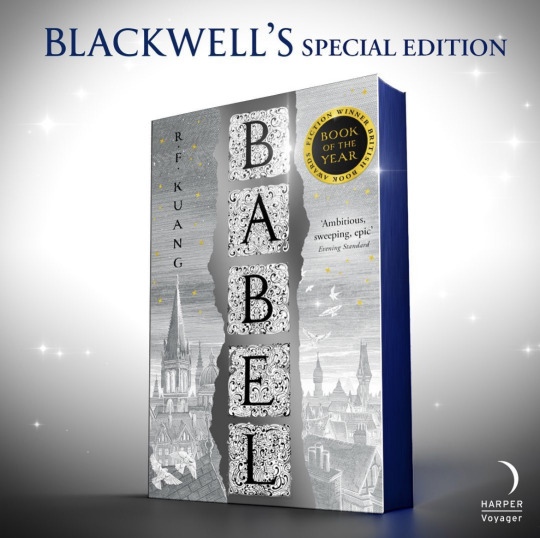
3 notes
·
View notes
Text
Romantic Escapes: Best Travel Destinations for Honeymoon Couples

Your honeymoon is the most romantic journey of your life. What better place to embark on this love-filled adventure than the incredible and diverse landscapes of India? From pristine beaches to enchanting hill stations, India offers a plethora of choices for couples seeking a perfect honeymoon destination. Let’s explore the Best travel destinations for honeymoon couples.
1. Goa — The Beach Paradise:
With its golden sandy beaches, azure waters, and vibrant nightlife, Goa is a tropical haven for honeymooners. Enjoy beachfront resorts, water sports, and delicious seafood.
2. Kerala — God’s Own Country:
Kerala’s backwaters, lush forests, and hill stations create a heavenly backdrop. Houseboat cruises and spa treatments make it an ideal spot for romance.
3. Udaipur — The City of Lakes:
Known as the ‘Venice of the East,’ Udaipur offers a royal experience. Stay in majestic palaces, take boat rides on Lake Pichola, and explore grand forts.
4. Manali — A Himalayan Retreat:
For mountain lovers, Manali is a paradise. Nestled in the Himalayas, it offers serene landscapes, adventure activities, and cozy mountain lodges.
5. Andaman and Nicobar Islands — Tropical Tranquility:
Crystal-clear waters, coral reefs, and secluded beaches make Andaman and Nicobar Islands a romantic escape for water-loving couples.
6. Jaipur — The Pink City:
Discover the rich heritage of Jaipur with its splendid palaces, vibrant markets, and enchanting forts. It’s perfect for history and culture enthusiasts.
7. Munnar — Tea Gardens and Serenity:
Munnar’s rolling tea gardens, misty hills, and serene ambiance make it an excellent choice for a tranquil honeymoon.
8. Agra — The City of Love:
A visit to the Taj Mahal is a must for every newlywed couple. Explore the city’s historical charm and be mesmerized by the symbol of eternal love.
9. Rann of Kutch — A White Wonderland:
The salt desert of the Rann of Kutch comes alive during the Rann Utsav. It’s a unique experience under the starry sky.
10. Darjeeling — The Queen of Hill Stations:
For a cozy escape, Darjeeling offers stunning views of the Himalayas, charming tea gardens, and a serene atmosphere.
Each of these destinations has its unique charm, making it an ideal choice for your honeymoon. India’s diversity ensures that there’s a perfect place for every kind of couple, whether you seek adventure, relaxation, or cultural exploration. So, pick the destination that resonates with your love story, and embark on your romantic adventure in this incredible country. India is not just a place; it’s a journey of love, unity, and togetherness.
Know more details on Destination Holiday Tours call us on 8888849698 / 9822632911 .
#best travel agent in india#best travel destinations in india#best tour and travel agents in pcmc#best travel agent in pcmc#destination holiday tours#best travel destinations for family#tour and travel operator near me
6 notes
·
View notes
Text
Unlocking the Wonders of India: Explore the Best India Holiday Packages

India Holiday Packages: Your Gateway to an Incredible Journey
Discover the best India Holiday Packages for an unforgettable adventure. Explore the diverse culture, breathtaking landscapes, and rich history. Get ready for an extraordinary experience.
Introduction
India, a land of myriad cultures, ancient history, and unparalleled beauty, has always been a dream destination for travelers worldwide. If you're planning your next vacation and want an experience that's both enriching and memorable, look no further than India Holiday Packages. In this article, we'll explore the enchanting possibilities that await you when you embark on a journey to this incredible country.
Exploring the Best India Holiday Packages
The Essence of India Holiday Packages
India Holiday Packages are more than just tours; they are gateways to a world where history and modernity coexist in perfect harmony. These packages are carefully curated to provide travelers with an authentic Indian experience, allowing you to immerse yourself in the vibrant culture, historical treasures, and natural wonders that India has to offer.
Types of India Holiday Packages
Cultural Escapades: Dive deep into India's rich cultural tapestry with visits to ancient temples, historical monuments, and traditional festivals.
Adventure Expeditions: For the adrenaline junkies, embark on thrilling adventures like trekking, river rafting, and wildlife safaris.
Romantic Getaways: India offers a plethora of romantic destinations, from the serene backwaters of Kerala to the enchanting palaces of Rajasthan.
Spiritual Journeys: Explore the spiritual side of India with visits to renowned pilgrimage sites and meditation retreats.
Luxury Retreats: Experience the opulence of India in style, with stays at luxurious resorts and royal palaces.
Culinary Delights: Indulge in a culinary journey with a focus on local cuisines and street food.
Wellness Retreats: Rejuvenate your mind and body with yoga and Ayurvedic treatments.
Why Choose India Holiday Packages?
India is vast and diverse, and planning a trip here can be daunting. India Holiday Packages take away the stress of organizing your journey. You'll have experienced guides, handpicked accommodations, and seamless itineraries, ensuring you make the most of your time in this beautiful country.
What Makes India Holiday Packages Unique
Unveiling the Treasures of India
The Golden Triangle: Explore the iconic cities of Delhi, Agra, and Jaipur on this quintessential tour.
The Serenity of Kerala: Discover the tranquil backwaters, lush forests, and tea plantations in God's Own Country.
The Majesty of Rajasthan: Dive into the regal history of Rajasthan by visiting its majestic forts and palaces.
First-Hand Experiences
Our India Holiday Packages are designed to offer you a glimpse of the real India. The sights, sounds, and flavors you encounter are not just part of an itinerary but a heartfelt invitation into the homes and hearts of the locals.
Supporting Credible Sources
We believe in transparency and credibility. Our packages are developed with the guidance of experienced travel experts and cultural enthusiasts, ensuring every detail is authentic and accurate.
Frequently Asked Questions
What is the best time to visit India?
The best time to visit India depends on the region you plan to explore. However, the winter months (October to March) are generally ideal for most parts of the country.
How do I choose the right India Holiday Package?
Consider your interests, the places you wish to visit, and your budget. Whether you're an adventurer, a history enthusiast, or a nature lover, there's a perfect package for you.
Is India safe for tourists?
India is generally safe for tourists. However, like any other destination, it's essential to take standard precautions, such as staying in reputable accommodations and being cautious with your belongings.
What should I pack for my trip to India?
Pack lightweight and breathable clothing, comfortable walking shoes, sunscreen, and any specific medications you may need. Don't forget to carry an adapter for your electronic devices.
Can I customize my India Holiday Package?
Yes, many tour operators offer customizable packages, allowing you to tailor your trip to your preferences and interests.
Are India Holiday Packages inclusive of all expenses?
Most packages include accommodation, transportation, and guided tours. However, be sure to check the specifics with your chosen tour operator.
Conclusion
India Holiday Packages offer the chance to experience India's magic in its full splendor. From the mighty Himalayas in the north to the pristine beaches in the south, from the bustling cities to the tranquil villages, India is a treasure trove waiting to be explored. Book your India Holiday Package today and embark on a journey of a lifetime.
#travel#vacation#adventure#beach#fun#hiking#camping#culture#history#holiday packages#india tour packages#tours#india holidays#adventure republiq#customized holiday packages
2 notes
·
View notes
Text
Experience Royal Splendor: A Palace Stay in Jaipur at The Palace By Park Jewels Hotels And Resorts
Imagine stepping into a world of opulence and grandeur, where every moment is a glimpse into the royal past of India. Jaipur, the Pink City, is renowned for its rich history and stunning architecture, and there's no better way to immerse yourself in its regal heritage than with a palace stay at The Palace By Park Jewels Hotels And Resorts.
The Palace By Park Jewels Hotels And Resorts: A Regal Retreat
Nestled in the heart of Jaipur, The Palace By Park Jewels Hotels And Resorts is a majestic haven that offers an authentic taste of Rajputana royalty. This 18th-century palace, lovingly restored to its former glory, welcomes guests with open arms. From the moment you arrive, you'll be transported to a bygone era of elegance and luxury.
Royal Accommodations
The Palace By Park Jewels Hotels And Resorts boasts a range of luxurious accommodations that cater to every traveler's preferences. Whether you're seeking a cozy room for a romantic getaway or a spacious suite for a family vacation, you'll find it here. Each room is exquisitely furnished with period décor, reflecting the splendor of Rajasthan's heritage.
Dining Fit for Royalty
A palace stay in Jaipur would be incomplete without indulging in the finest culinary experiences. The Palace By Park Jewels Hotels And Resorts offers a range of dining options that will tantalize your taste buds.
1. The Royal Dining Room: This exquisite restaurant serves a curated menu of traditional Rajasthani and international cuisines. The elegant setting and attentive service create the perfect atmosphere for a romantic dinner or a family gathering.
2. The Palace Courtyard: Dine under the starlit sky in the palace's courtyard, surrounded by the mesmerizing architecture of the palace. The open-air setting adds an extra layer of magic to your dining experience.
3. In-Room Dining: For those moments when you prefer the comfort of your room, the hotel offers a 24/7 in-room dining service. Savor delicious dishes from the comfort of your luxurious abode.
Explore Jaipur's Rich Heritage
While your palace stay at The Palace By Park Jewels Hotels And Resorts will undoubtedly be a highlight of your trip, don't forget to explore the city's cultural and historical treasures. Jaipur is renowned for its magnificent forts, intricate palaces, and vibrant markets. The hotel's concierge desk can assist you in planning your outings, ensuring you don't miss any of the city's iconic landmarks.
Unwind and Rejuvenate
After a day of sightseeing, return to your palace retreat for some relaxation and pampering. The Palace By Park Jewels Hotels And Resorts offers a range of wellness facilities, including a spa, swimming pool, and fitness center. Rejuvenate your body and soul with holistic spa treatments that draw from ancient Indian traditions.
Plan Your Palace Stay in Jaipur
To book your royal palace stay in Jaipur at The Palace By Park Jewels Hotels And Resorts, simply call 0141 665 5555 or visit our website at https://thepalacejaipur.com/. Our dedicated team is ready to assist you in creating an unforgettable experience filled with regal charm and modern comfort.
In Conclusion
A palace stay in Jaipur is more than just a vacation; it's a journey into the rich history and culture of Rajasthan. The Palace By Park Jewels Hotels And Resorts provides the perfect backdrop for creating lasting memories of your time in the Pink City. Immerse yourself in royal splendor, dine like a king, and explore the city's treasures, all while enjoying the impeccable hospitality of this regal retreat. Make your reservation today and embark on an unforgettable journey to Jaipur's past and present.
2 notes
·
View notes